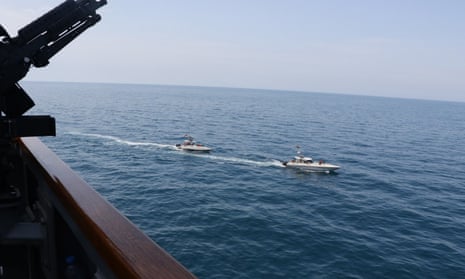A dangerous encounter between the Iranian and US navies in the Persian Gulf last month, provoked by 11 Iranian Revolutionary Guards’ speedboats, and President Trump’s threat one week later to shoot Iranian gunboats out of water if this happens again, are stark reminders of the short fuse between the two countries amid growing tensions. If they want conflict to wag the dog and deflect attention from their failures to fight the Covid-19 outbreak in their respective countries, they can easily stumble into one; but if they don’t, as they often claim, they should find a way to establish a military hotline.
Imagine that the Swiss embassy in Tehran had not communicated the end of Iran’s missile attacks on US military installations in Iraq after Tehran retaliated against the US killing of its senior commander, General Qassem Suleimani, in January, helping ensure a dangerous situation did not escalate further. Or that in 2016, when Iran’s Revolutionary Guards detained 10 US sailors travelling aboard two riverine boats drifted into Iranian territorial waters in the Persian Gulf, the then US secretary of state, John Kerry, had no direct contacts with his Iranian counterpart, the foreign minister, Mohammad Javad Zarif. Within 30 minutes of learning of the incident, the two men spoke “at least five [times]… over a period of roughly 10 hours”. Iran released the boats and crew the following morning.
In the current climate of acrimonious exchanges between the two countries, competing claims that the other’s military is engaged in terrorist acts and little direct interaction between senior diplomats, as well as the US blacklisting of Zarif in 2019, Washington and Tehran need a military de-escalation channel to avoid inadvertent conflict in a moment of crisis.
Tensions emanating from the Trump administration’s “maximum pressure” campaign against Iran and Tehran’s “maximum resistance” response of escalating in the region and ramping up its nuclear programme, triggered by the US withdrawal from the Iran nuclear deal in May 2018 and the re-imposition of sanctions, nearly brought the two sides into full-fledged conflict three times in the past 11 months. The first was in the aftermath of Iran’s shooting down of a US drone in June 2019; then in September, when Iran stood accused of having attacked Saudi oil infrastructure; and again when the US killed General Suleimani in January, triggering retaliatory Iranian missile strikes in Iraq. The Covid-19 pandemic could have provided a window for a humanitarian ceasefire, but instead appears to have become an occasion for displaying a hardening of positions.
With neither side willing to yield, a dearth of effective communication channels, stalled diplomacy and a wide arc of regional flashpoints where the US, Iran and their respective allies are tensely poised, a single incident, even if minor, could quickly spin out of control.
While the Swiss channel proved effective for conveying high-level messages, it is designed for diplomatic, not military, communication and may not prevent an incident during a standoff between military ships from turning into a shoot-out. Twitter has provided an unusual means of direct communication and signalling between key officials on both sides. But it is hard to see such a public platform that encourages polemics and harsh rhetoric being effective in preventing inadvertent escalation.
While a US-Iran de-escalation mechanism can draw on past US experiences with military communications links with adversaries, including the Soviet Union, China, Russia and Iran-backed Iraqi paramilitary groups, it will require some innovation. In the absence of a US-Iran Incidents at Sea agreement and diplomatic relations, as well as reciprocal designations of their militaries in the Gulf as foreign terrorist organisations, any hotline will have to go through an intermediary.
The ideal third-party candidate would combine deep expertise in Gulf navigation with experience in mediation and constructive diplomatic relations with both the US and Iran. Based on these considerations, Oman would be a particularly strong candidate. It manages security for shipping exiting the Strait of Hormuz into the Gulf of Oman, and as a result has technical acumen and expertise in relaying communications. It has previously facilitated US-Iran communication. And both sides have typically considered it an honest broker. Oman has a military cooperation agreement with the US, and jointly operates a military commission with Iran.
In one possible design, a one-star general within US Central Command’s leadership would communicate by telephone with an Omani general maintaining a separate telephone line with a counterpart on the Iranian general staff.
Critics of such a mechanism may contend that, owing to high tensions and hostility between Tehran and Washington, establishing a line of contact for operational de-escalation is likely to encounter insurmountable political opposition, and that it may prove ineffectual even if established. But its potential to prevent a catastrophic miscalculation and inadvertent escalation outweighs its costs and risks, even if its remit is limited. Also being modest in scope and ambition, it would not require any significant departure from the Trump administration’s “maximum pressure” approach, nor would it entail Iran endorsing a US military presence in the region, which it rejects as a matter of principle.
Overcoming obstacles facing any US-Iran channel, even a mediated one, will be difficult, especially given the wider diplomatic impasse and distrust between the two sides. But at this perilous moment, it would be important to try.
